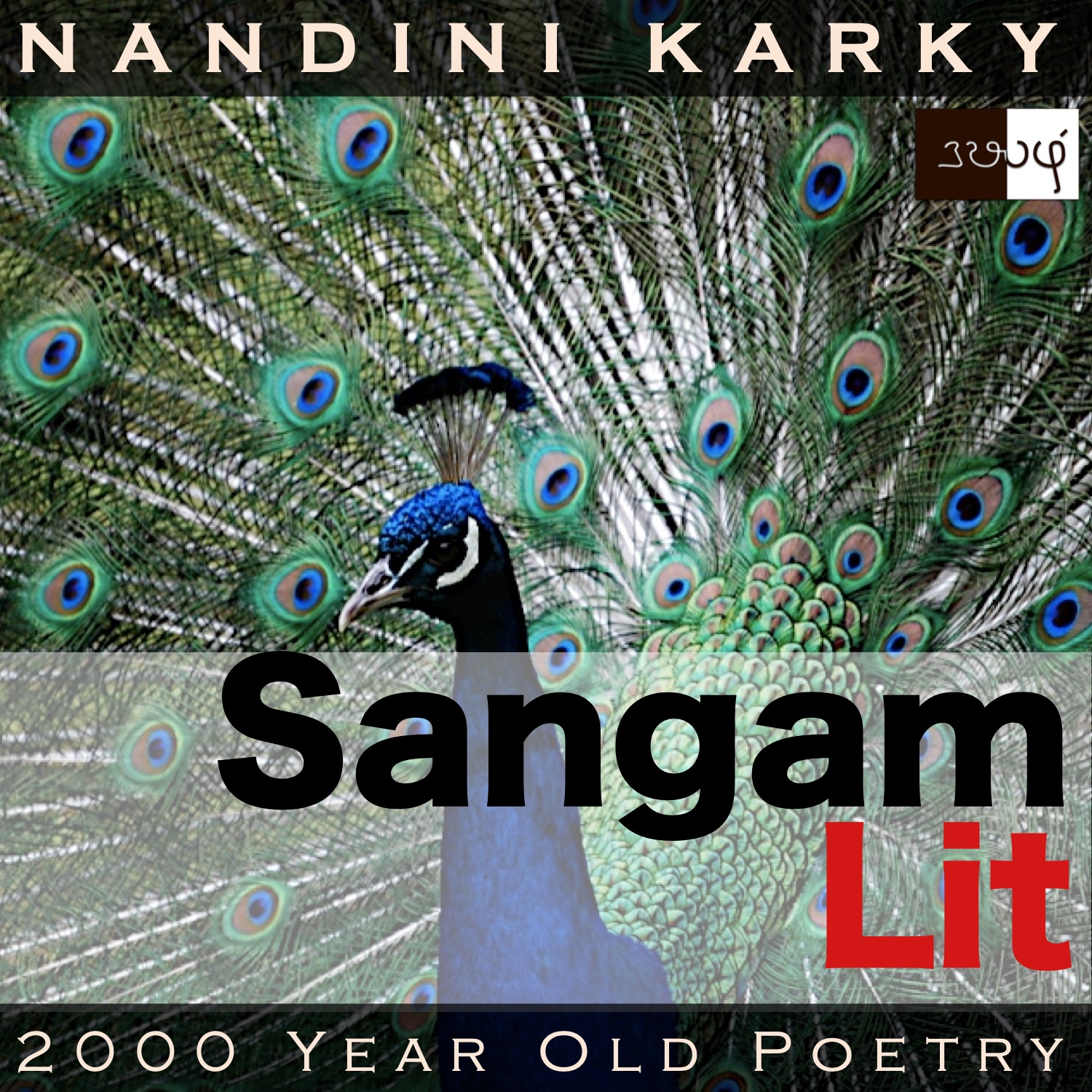Podcast: Play in new window | Download
Subscribe: Apple Podcasts | Spotify | Amazon Music | Android | iHeartRadio | TuneIn | RSS | More

In this episode, we perceive agricultural customs in a mountain country, as depicted in Sangam Literary work, Kurunthogai 105, penned by Nakirar. Set in the hills of ‘Kurinji’, the verse speaks in the voice of the lady to her confidante, relaying her frustration at the man’s delay in seeking her hand in marriage.
புனவன் துடவைப் பொன்போற் சிறுதினைக்
கடியுண் கடவுட் கிட்ட செழுங்குரல்
அறியா துண்ட மஞ்ஞை ஆடுமகள்
வெறியுறு வனப்பின் வெய்துற்று நடுங்கும்
சூர்மலை நாடன் கேண்மை
நீர்மலி கண்ணொடு நினைப்பா கின்றே.
The dance of a possessed one is the central theme in this one! The opening words ‘புனவன் துடவை’, meaning ‘a mountain farmer’s cultivated land’ establishes the presence of agriculture even in the rugged mountain ranges. We get to see the crop being cultivated in ‘பொன்போற் சிறுதினை’ meaning ‘small millets that are like gold’. A curious phrase ‘அறியா துண்ட மஞ்ஞை’ meaning ‘a peacock that unknowingly ate’, makes us wonder about the food that it consumed and why it deserves a mention. Then, the focus turns to ‘ஆடுமகள் வெறியுறு வனப்பின்’ meaning ‘in the shade of a dancer, who is possessed’. Ending with the words ‘நீர்மலி கண்ணொடு நினைப்பா கின்றே’ meaning ‘with tear-filled eyes, it becomes a memory’, the verse paints a portrait of the sorrowful state of the protagonist.
What do those golden millets have to do with a possessed dance? The context reveals that the man and lady had been leading a love relationship and that the man had been trysting with her for a while. When he’s delayed from seeing her for many days, the lady is filled with worry and tells her confidante, “In the mountain farmer’s field, where gold-like little millets grow, fresh stalks laid out as the first offering to god, was eaten up by a peacock unknowingly. Eating which, akin to a possessed dancer, the bird shivers in terror, in the god-dwelling mountains of the lord. His relationship has become just a memory accompanied by tear-filled eyes.” With these words, the lady remarks at how the relationship with the man seemed to leave her only with fear of the future!
Scenes that unfold in this rugged landscape seem to hold hidden layers within. The lady starts by transporting us to an ancient mountain farmer’s field. As we gaze upon this luscious land, the yellow shoots make us wonder if it’s gold growing on the fields. Informing that these are little millets being grown by the farmer, to whom it must be gold indeed. Beckoning to another corner of the field, the lady points to some fresh and fleshy stalks of this millet lying there. In a whisper, the lady tells us these are not any old crops lying about, but the precious first harvest from the field that has been offered to the gods. As we look upon reverently, a peacock arrives at that place and caring not about god, pecks at the food it finds, without a thought. As this is happening, the lady seems to be shaking her head in disbelief and hints to us that no good can come out of the peacock’s thoughtless actions. Sure enough, the next moment, we see this bird swaying and quivering, and the lady turns to us and tells us, ‘as predicted’. She also compares these actions of the peacock to that of a dancer, who trembles when god descends on her, in the town festival!
A moment to meander and tell people from different cultures how this custom of a possessed dance can be seen till this day, in temple festivals in South India. People witnessing this frenetic dance believe that it’s the god of the festivities, who has taken over the body of the dancer, making them listen with attention, to the delirious pronouncements of the possessed dancer. Returning to the verse, the lady has mentioned the peacock in parallel to the possessed dancer, only to say such scenes are unfolding in the lord’s land, decked with mountains, where fear-evoking gods dwell. She ends with the lament that the relationship with the man seemed to be one that was not a reality but a mere thought that has made her eyes well with tears. In the reference to the peacock eating god’s food unknowingly, the lady places a metaphor for her own situation, wondering if she too had unknowingly become close to someone not suitable for her, for indeed the man’s delay in seeking her hand was making her tremble akin to that naive peacock, possessed by God’s anger. Perhaps, she also worries if the man would be so harmed by god’s ire for the man’s unfulfilled promises to her.
Leaving aside these interpretations, when we zoom on the act of offering the first harvest to god, we understand how these people are perpetuating an age-old custom. Maybe, in the prior generations, such offerings were indeed made as a penance for changing the land and disturbing the life of animals and birds living there for millennia, for the sake of human advancement. Maybe, the first farmers offered such stalks of grain to the wildlife around, asking for their acceptance. But, with time, like all religious customs, perhaps this act became routine and took on abstract angles. Those first farmers may even have welcomed the eating of their offering by a bird such as this peacock but over the generations, that came to be depicted as something not intended. Fascinating how these few lines of the verse have made us reflect on the transition to agriculture and its impact on wildlife, and that’s the power of art, to make us go beyond the confines of space and time, and sense the unsaid!




Share your thoughts...